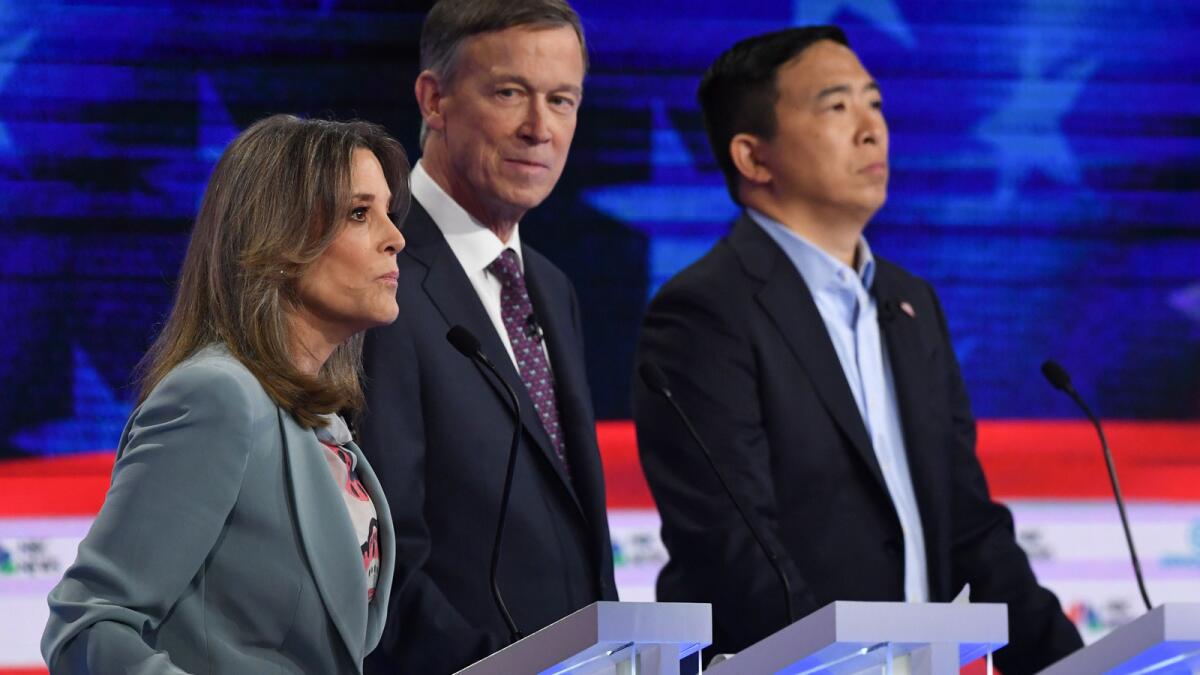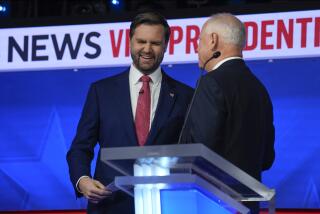Democratic debates mirror life: Men yell and interrupt. Women (mostly) wait their turn

- Share via
Like millions of Americans, I closely watched two nights of debates among the Democratic presidential contenders. I came away persuaded that the party is indeed bending left and that any one of the candidates presents a welcome contrast to the corporatism, cruelty and mendacity of the current administration.
Their policy positions are broadly similar — they all embrace universal healthcare and some version of free college. None would deport otherwise law-abiding immigrants who are in the country illegally. Some are terrified of the word “socialism.”
But I was watching for something more subtle.
How would they treat each other?
With a record number of women vying for the nomination, would the debate dynamic be altered by their presence?
Would there be less interrupting and grandstanding, less mansplaining, fewer insults?
Or would the men be tempted to patronize the women in the style of then-Sen. Barack Obama, who turned to then-Sen. Hillary Clinton on a New Hampshire debate stage in 2008 and said, “You’re likable enough, Hillary.”
That insult, by the way, did not endear him to New Hampshire’s female voters. Three days later, Clinton whomped Obama in the primary. Women had given her an edge.
On Wednesday, Massachusetts Sen. Elizabeth Warren, Minnesota Sen. Amy Klobuchar and Rep. Tulsi Gabbard of Hawaii took the stage with seven men.
A handful of their male opponents were serial interrupters — they just couldn’t help it — while the women were almost uniformly polite and waited to be called on.
New York Mayor Bill de Blasio was a terrible offender. Former Maryland Rep. John Delaney, whom most people have never heard of, was a close second.
The men talked and talked, but the women had the best lines.
“Do you have a plan to deal with Mitch McConnell?” NBC’s Chuck Todd asked Warren, the wonk who has rolled out detailed policy proposals every week since March.
“I do,” she replied.
When Washington Gov. Jay Inslee cluelessly declared he was the only person on stage to have passed legislation supporting reproductive rights, Klobuchar gently chastised him: “There’s three women up here who have fought pretty hard for a woman’s right to choose,” she said.
If he was abashed — and he should have been — he didn’t show it.
Likewise, Rep. Tim Ryan of Ohio was corrected by Gabbard, a major in the Army National Guard and an Iraq combat veteran. She wants the U.S. out of Afghanistan; he argued that the U.S. needs to maintain a military presence, otherwise the Taliban will fly planes into American buildings the way it did on 9/11.
“The Taliban didn’t attack us on 9/11,” said Gabbard dryly. “Al Qaeda did.”
“I understand,” Ryan sputtered.

Thursday’s debate stage also featured three women — California Sen. Kamala Harris, New York Sen. Kirsten Gillibrand and the self-help author-who-hates-to-be-called-a-guru Marianne Williamson.
I will note that not three minutes had passed before Colorado Sen. Michael Bennet tried to interrupt the moderator, NBC anchor Savannah Guthrie.
“Sen. Bennet, we’re going to get to everybody, I promise,” Guthrie said.
“No, I’d like to say something,” he replied.
There seems to be an immutable law of nature that when men are in a group that includes a few women, they talk over the women. They can’t help it. And there’s a corollary: Other women notice.
On Thursday, nearly 20 minutes had passed, and Williamson had yet to speak. Even Andrew Yang, the tech entrepreneur with the offbeat plan to give a guaranteed income of $1,000 a month to every American, had been able to give his spiel.
“I’d like to say something, if I might,” I heard her say almost plaintively.
No one seemed to notice, as the men were cross-talking.
Gillibrand, who combined the male tendency to interrupt with the female tendency to make sure everybody’s OK, pointed toward her and addressed her directly:
“Marianne, did you have a turn?” she asked. “All the men are speaking over you. Can Marianne have a turn?”
::
There was more than a gender gap on display Thursday night.
There was a strained attempt by 38-year-old Bay Area Rep. Eric Swalwell to call attention to the generation gap between the younger candidates and the two old lions, former Vice President Joe Biden, 76, and Vermont Sen. Bernie Sanders, 78.
More than once, Swalwell urged them to “pass the torch” to a new generation.
The lions weren’t having it, and who could blame them?
Biden smiled and swatted Swalwell away: “I’m still holding on to that torch.”
Bernie, for his part, just scowled and kept talking.
I tried to suppress the mental image of Statler and Waldorf, the cantankerous Muppets in the balcony.
Harris was far more successful exploiting the generation gap. She pointedly called out Biden for opposing busing to integrate public schools in the 1970s. Her tone was rueful, but she’d clearly been waiting to take him down.
“It was hurtful to hear you talk about the reputations of two United States senators who built their reputations and career on the segregation of race in this country,” she told Biden, in what became the breakout moment of the Thursday debate.
“You also worked to oppose busing. And you know, there was a little girl in California who was part of the second class to integrate her public schools, and she was bused to school every day. And that little girl was me.”
Biden floundered. He didn’t oppose busing, he said. He was opposed to the Department of Education ordering it.
He trumpeted his support for civil rights, then inadvertently offered what will probably go down as the overarching metaphor for his campaign: “Anyway, my time is up. I’m sorry.”
Twitter: @AbcarianLAT
More to Read
Sign up for Essential California
The most important California stories and recommendations in your inbox every morning.
You may occasionally receive promotional content from the Los Angeles Times.











